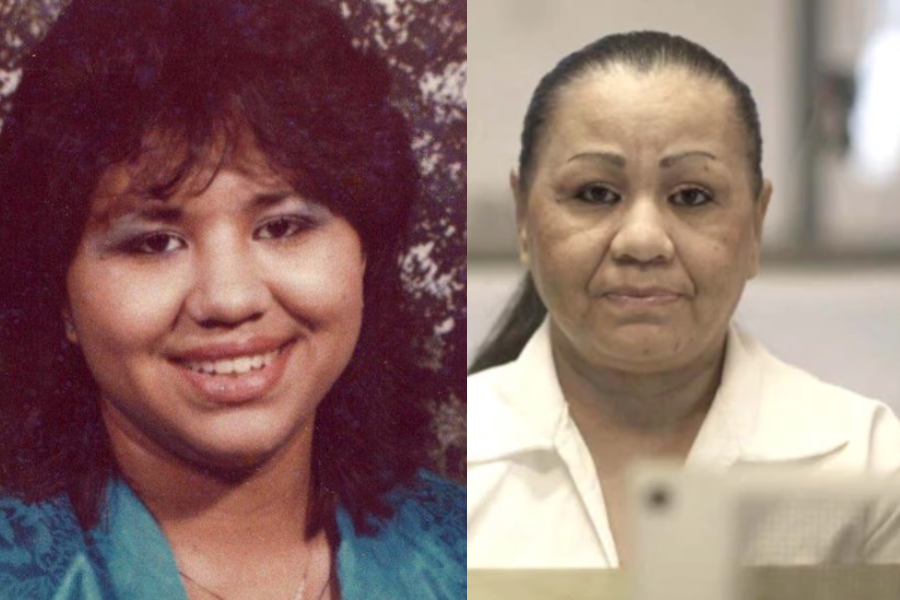“The Untold Story: Delving into the Truth Behind Melissa Lucio’s Daughter’s Autopsy Photos” And All About Life…
In 2008, Melissa Lucio lost her 2-year-old girl Mariah unfortunately when she tumbled down certain means. Far more detestable, Melissa was erroneously blamed by the experts for killing her girl while she was encountering shock and anguish. She was a crushed mother when she was arrested and tossed into a court battle that would at last bring about her execution in Texas.
The State of Texas has set Melissa Lucio’s execution date on April 27, despite her claims that she was involved in the homicide for which she is accused. On her part, her legal team has been tenaciously seeking justice.
In February, they filed a move to stay or modify her execution date, and in March, they appealed for mercy to the governor and the Texas Board of Pardons and Paroles. Melissa’s life is in danger in spite of their attempts.
Her counsel filed a habeas corpus petition with the Texas Court of Criminal Appeals on April 15, seeking a stay of execution. They argue Melissa should be granted a second opportunity at trial because the state used flawed evidence against her and withheld crucial information that may have erased her record, and because Melissa is innocent. In her continued pursuit of justice, Melissa Lucio hopes to cleanse her reputation and prevent an unjust death.
Melissa Lucio Daughter Autopsy Photos:
On February 15, 2007, tragedy struck the Lucio family as they were in the midst of a move. Mariah, their 2-year-old daughter born with a slight physical disability, suffered a fatal fall. Her unsteady gait made her prone to stumbling, and just two days later, she peacefully passed away.
Instead of thoroughly investigating Mariah’s medical history and the circumstances surrounding her injuries, authorities rushed to judgment.Immediately dismissing the likelihood that it was a terrible accident, they suspected nefarious activity. They coerced Ms. Lucio into making a false confession during the questioning process.
Startling data from the National Registry of Exonerations highlights a concerning fact: over one-third of the women who have been cleared were falsely accused of causing harm to their own relatives or others in their care.
Even more alarming is that over 70% of these convictions were based on events that never even occurred — whether they were tragic accidents, cases of self-harm, or entirely fabricated incidents.
Melissa has spent more than 14 years preserving her innocence:
For almost 14 years, Melissa Lucio has stood up for her innocence even when there was a chance she would be put to death. She has fiercely maintained her innocence over a hundred times in the face of abusive interrogations.
But in a tragic turn of events, she was forced by the police to falsely acknowledge that she was partly to blame for Mariah’s injuries. Melissa adamantly protested to the interrogators that she had no malevolent intent and had never hurt her own children, but they would not listen.
Two hours after her daughter’s death, Melissa was subjected to an abusive interrogation by the police:
It took detectives only two hours to find and arrest Ms. Lucio for interrogation following Mariah’s untimely death. She was subjected to constant berating and intimidation throughout a torturous five-hour questioning. She was pregnant and still in shock at the death of her child. There was a
lot of pressure because of the cops’ use of coercive tactics, which are known to produce false confessions.
Research has indicated that people, especially those who have gone through trauma like Ms. Lucio, are quite prone to lying when forced to do so. Experts who carefully examined Ms. Lucio’s case, including her records of interrogation, came to the consensus conclusion that she had been subjected to persistent pressure and coercive tactics while being questioned.
After enduring prolonged interrogation, Ms. Lucio finally uttered, “I guess I did it,” along with other potentially incriminating remarks, simply to end the traumatic ordeal with the detectives. Tragically, the prosecution twisted her inadvertent statement into a confession of murder. Adding to the injustice, two of the officers who interrogated her were also present during Mariah’s autopsy, casting doubt on the objectivity of the autopsy findings.
During Melissa’s trial, there was evidence that was both false and deceptive:
The medical examiner gave scathing evidence during Ms. Lucio’s trial, asserting that Mariah’s wounds and bruises were obvious indicators of abuse. However, pathologists discovered flaws in this testimony after a closer look. The results of Mariah’s autopsy indicated that she had a blood coagulation issue, which frequently causes severe bruises all over the body. Furthermore, it was found that Mariah was recovering from an injury to her arm when she passed away, which the coroner had used as additional proof of maltreatment. But a pediatric orthopedic physician disapproved, saying Mariah’s fracture looked like a typical toddler injury that generally happened from falling from a standing height.
Moreover, under a microscope, the medical examiner’s conclusion that some markings on Mariah’s body were indentations was refuted. Although indentation analysis was formerly thought to be dependable, major experts have subsequently questioned its trustworthiness. Research has indicated that even skilled forensic dentists frequently cannot agree on whether an injury qualifies as an indentation. The Texas Forensic Science Commission recommended a statewide ban on the use of indentation evidence in criminal proceedings in 2016 after realizing that indentation evidence lacked scientific validity and that a Texas person had been exonerated due to faulty indentation evidence.
There was no proof from the state that Melissa mistreated any of her kids:
Extensive records from Child Protective Services, spanning thousands of pages, paint a clear picture: there’s no trace of any allegations from Ms. Lucio’s 12 children about her supposedly violent behavior towards them. Not a single case worker documented any signs of abuse, and there’s no tangible evidence to suggest otherwise.
In a scathing critique, Judge Catharina Haynes, speaking on behalf of seven dissenting judges from the U.S. Court of Appeals for the Fifth Circuit, pointed out the state’s failure to provide any physical evidence or witness testimonies linking Ms. Lucio to the alleged abuse or Mariah’s tragic death. Judge Haynes expressed disappointment at the jury’s lack of access to crucial evidence necessary for fair deliberation.
Despite facing numerous challenges in providing for her family, Ms. Lucio showed unwavering love and dedication as a mother. She did her best to navigate through incredibly difficult circumstances, demonstrating her commitment to her children’s well-being.
Melissa has endured a lifetime of domestic abuse and sexual assault:
In the midst of chaos, Ms. Lucio’s 12 children remained steadfast in their support, never once accusing her of violence. This fact is affirmed by thorough records from Child Protective Services, which found no signs of abuse despite diligent investigation. There simply wasn’t any evidence to suggest otherwise.
Judge Catharina Haynes, representing seven dissenting judges from the U.S. Court of Appeals for the Fifth Circuit, didn’t mince words in her criticism of the State’s failure to provide concrete evidence or witness testimonies linking Ms. Lucio to the alleged abuse or Mariah’s tragic death. The absence of such crucial evidence left the jury lacking vital information for their deliberations.
Even though she had to work very hard to support her family, Ms. Lucio was a devoted mother who never wavered in her affection. She showed her resolute dedication to her children’s welfare by doing her hardest to get through really challenging conditions.
A new trial is being requested by a few of Melissa’s jurors because the jury did not hear her defense:
As of April 12, Melissa’s legal team took a significant step by submitting a supplemental clemency petition. This petition included a new declaration from the jury foreperson, adding to the voices of four other jurors and an alternate, all urging for a halt to Melissa’s impending execution or a new trial considering compelling evidence of her innocence.
In a heartfelt op-ed published in the Houston Chronicle, Johnny Galvan Jr., one of the jurors from Ms. Lucio’s trial, expressed deep regret and acknowledged a newfound belief that the jury had made a mistake in their verdict. He emphasized the abundance of doubt surrounding Ms. Lucio’s case, stating that, given the chance, he would change his previous vote.
Crucially, the jury was not informed about the substantial influence that Ms. Lucio’s background of marital abuse and child sex abuse had on her feelings after her daughter passed away. The Texas Ranger, who pressured Ms. Lucio into making an incriminating confession, was permitted to testify falsely on behalf of the prosecution, but this important testimony was excluded by the trial court despite its importance. The jury’s opinion was definitely impacted by his deceptive description of Ms. Lucio’s behavior throughout the interview, which included her slouched posture, seeming lack of interest, and avoidance of eye contact as indicators of guilt.
The safeguard’s case was truly debilitated by the absence of this significant foundation, particularly considering the indictment’s weak proof for capital homicide and, surprisingly, more weak case for capital punishment. Significant is the way that Ms. Lucio had no earlier history of savagery, further highlighting the blemishes in the arraignment’s story.
Facts:
- In 2008, Melissa Lucio was wrongly convicted of the murder of her 2-year-old daughter, Mariah, who tragically fell down some stairs.
- Despite Melissa’s claims of innocence, the State of Texas has scheduled her execution for April 27, 2024.
- Melissa’s legal team has filed motions to halt or modify her execution date, seeking justice for her.
- They argue that Melissa deserves a new trial due to flawed evidence and withheld information proving her innocence.
- Melissa has endured years of abuse and trauma, including coerced confessions and a lack of fair trial procedures.
- Medical evidence regarding Mariah’s injuries has been disputed, with experts casting doubt on the prosecution’s claims.
- Despite extensive investigations by Child Protective Services, there is no evidence of Melissa mistreating her children.
Summary:
Melissa Lucio’s harrowing ordeal began in 2008 when her daughter, Mariah, tragically fell down stairs and passed away. Despite grieving her daughter’s loss, Melissa was arrested and wrongfully convicted of Mariah’s murder. Her legal team has been tirelessly fighting for justice, filing motions to halt her execution and seeking a new trial based on flawed evidence and withheld information. Melissa’s case highlights the shortcomings of the justice system and the urgent need for reform to prevent miscarriages of justice.
FAQ:
1.Is there evidence supporting Melissa’s innocence?
Despite extensive investigations and expert testimonies casting doubt on the prosecution’s claims, there is no concrete evidence linking Melissa to her daughter’s death.
2.Why is Melissa’s case significant?
Melissa’s case highlights systemic flaws in the justice system, including coerced confessions, lack of fair trial procedures, and wrongful convictions.
3.What actions has Melissa’s legal team taken?
Melissa’s legal team has filed motions to halt or modify her execution date, seeking a new trial based on flawed evidence and withheld information.
4.What is the status of Melissa’s case?
As of April 15, 2024, Melissa’s legal team has filed a habeas corpus petition with the Texas Court of Criminal Appeals, seeking a stay of execution and advocating for a new trial based on her innocence.
Explore the latest fashion trends, beauty tips, and lifestyle inspiration at GlamourHeadline.com.





